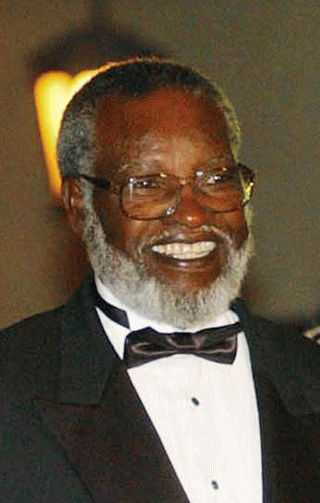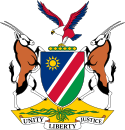
The South West Africa People's Organisation, officially known as the SWAPO Party of Namibia, is a political party and former independence movement in Namibia. Founded in 1960, it has been the governing party in Namibia since the country achieved independence in 1990. The party continues to be dominated in number and influence by the Ovambo ethnic group.

Samuel Shafiishuna Daniel Nujoma, is a Namibian revolutionary, anti-apartheid activist and politician who served three terms as the first President of Namibia, from 1990 to 2005. Nujoma was a founding member and the first president of the South West Africa People's Organization (SWAPO) in 1960. Prior to 1960, SWAPO was known as the Ovambo People's Organisation (OPO). He played an important role as leader of the national liberation movement in campaigning for Namibia's political independence from South African rule. He established the People's Liberation Army of Namibia (PLAN) in 1962 and launched a guerrilla war against the apartheid government of South Africa in August 1966 at Omungulugwombashe, beginning after the United Nations withdrew the mandate for South Africa to govern the territory. Nujoma led SWAPO during the lengthy Namibian War of Independence, which lasted from 1966 to 1989.

Gaob Dr. Justus ǀUruhe ǁGaroëb is the Gaob (King) of the ǂNūkhoe ǁAes as of 1977 [year of customary designation] and is the longest serving supreme traditional leader in recorded history. Historical accounts have it that most gaogu (kings) reigned for 25 years (average), whilst the nation celebrated the Sapphire Anniversary of the ǁGaroëb dynasty. He (just like most if not all pre-independence traditional leaders was active in national politics and was at the forefront of the Namibian struggle for Independence. Gaob Dr. ǁGaroëb was a staunch opponent of South African rule and led the oppositional Namibia National Front in the late 1970s and founded the United Democratic Front in 1989.
The United Democratic Front (UDF) is a political party in Namibia. Justus ǁGaroëb founded the party in 1989 and led it until 2013. He was succeeded by Apius Auchab.
Herman Andimba Toivo ya Toivo was a Namibian anti-apartheid activist, politician and political prisoner. Ya Toivo was active in the pre-independence movement, and is one of the co-founders of the South West African People's Organisation (SWAPO) in 1960, and before that, its predecessor the Ovamboland People's Organization (OPO) in 1959.

Libertina Inaviposa Amathila is a Namibian physician and politician. She was the deputy Prime Minister of Namibia from 2005 to 2010.
The Ovamboland People's Organization (OPO) was a nationalist organization that existed between 1959 and 1960 in South West Africa. The aim of the organization was to end the South African colonial administration, and the placement of South West Africa under the United Nations Trusteeship system. Andimba Toivo ya Toivo had founded its predecessor, the Ovamboland People's Congress, in 1957 in Cape Town, South Africa. In 1959, Sam Nujoma and Jacob Kuhangua established the Ovamboland People's Organization (OPO) at the Old Location in Windhoek. Sam Nujoma was the president of OPO until its transformation into the South West Africa People's Organization (SWAPO) a year later and remained president until Namibia gained independence in 1990.

Heroes' Acre is an official war memorial of the Republic of Namibia. Built into the uninhabited hills 10 kilometres (6 mi) south of the city centre of Windhoek, Heroes' Acre opened on 26 August 2002. It was created to "foster a spirit of patriotism and nationalism, and to pass [this] to the future generations of Namibia".
Eric Biwa is a former Namibian politician with the Patriotic Unity Movement (PUM), a party which was a member of the United Democratic Front (UDF).
Members of the 3rd National Council of Namibia, which lasts from 2004 - 2009. The chairperson is Asser Kuveri Kapere of the South West Africa People's Organization. 24 of the 26 members of the National Council are members of SWAPO, while one is from the United Democratic Front and one is from the Democratic Turnhalle Alliance. All Councillors below are SWAPO members unless otherwise stated.
Johannes Gerard Adolph Diergaardt, more commonly known as Hans Diergaardt was a Namibian politician active for nearly a decade after Namibia gained independence. Prior to that, he was elected as the fifth Kaptein of the then-autonomous Baster community at Rehoboth, succeeding Dr. Ben Africa in 1979 after winning a court challenge to the disputed election of 1976.
The Federal Convention of Namibia (FCN) was a political party based in Rehoboth, Namibia. It was created in the wake of Namibian independence in 1988 by a merger of several smaller parties and gained a seat in the Namibian Constituent Assembly. After also-ran results in 1994 and 1999 it ceased to be publicly active.

The Cabinet of Namibia is an appointed body that was established by Chapter 6 of the Constitution of Namibia. It is mandated to include the following positions: the President of Namibia, the Prime Minister of Namibia and any positions that the President so appoints.
Moses Mague ǁGaroëb was a Namibian politician, founding member of SWAPO, and member of SWAPO's Politburo and Central Committee. During his political career, ǁGaroëb served in the Constituent Assembly of Namibia and was a Member of Parliament from the day of Namibian independence, 21 March 1990. He was appointed Minister of Labour and Human Resources in 1995, a position he held until his death.
Mburumba Kerina was a Namibian politician and academic. He was a co-founder of SWAPO, NUDO, and FCN, and the founder of a host of smaller political parties. For independent Namibia, he was a member of Namibia's Constituent Assembly, as well as the National Assembly and the National Council. Kerina coined the name "Namib" for the independent state "Namibia" on the territory of South West Africa.







